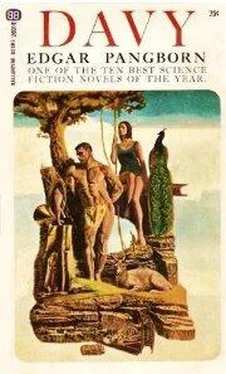There was a story I was compelled to write, inwardly compelled, no doubt by an obscure hope that in writing it I would come to understand it better myself. That was the story of a particular part of growing up (as far as an experience so continuous can have any “parts”), the story of a boy who came out of one condition into another and a wider one, though perhaps even less than a quarter-inch taller in the busy flesh. Now that story, I was surprised to notice a while ago, I have completed. What happened to me with the Ramblers happened to a far older boy; my meeting with Nickie (which I shall tell you about before long, I think) happened to a man. These are other stories, maybe beyond my power to write, maybe not. However — because there was a voyage, because life is continuous as daylight between dawn and dark, because I was concerned with varieties of time, because I heard no objections from your Aunt Cassandra nor yet from her yellow tomcat with the bent ear — that original story of a boy’s journey grew inseparably in, out of, over, under, through, around, by, with and for those other stories; which obliges me to complete them too — a little bit. (Ask your Aunt C. how it’s possible to complete something “a little bit” — you would have to exist in order to analyze and enjoy a literary gidget like that one, and you’re probably not up to it.) I don’t suppose there’s any need to explain where that boy’s special story ended or partly ended, since it will be obvious almost immediately to a learned, compassionate, profoundly and generously perceptive scholar and gentleman — or quail — like yourself.
Merely notice and remember, if you wish, that for a good many pages now, and on to the end of the book whenever and wherever that may happen, we — I mean myself and you more or less with me, which after all comes fairly close to admitting you might exist — well, we are like people who have finished one day’s journey, and find that here at the inn there’s still some time for drinks and conversation before we sleep.
* * *
“Look at him there!” says Mam Laura — “only look at him sitting there with a redheaded face hung up perpendicularly forninst his brains, trying to tell me you mustn’t split an infinitive! Mustn’t, mustn’t, mustn’t, frig mustn’t! Why, Davy? Why?”
“Well, that grammar book says—”
“Bugger the buggerly book!” she’d cry out. “I want to hear one stunk-up lonely reason why you mustn’t!”
“To be honest, I can’t think of any. It don’t explain—”
“Doesn’t explain. And being honest is what I’m after,” she said, mollified and sweet and smiling again. “You see, Sam, the boy has intelligence; he only needs to have the school rubbish beaten out of him like dust out of a rug. Well, the grammar book doesn’t explain, Davy, because it relies on authority, which is all right and necessary within limits in such a book; if it tried to explain everything along the way it would stop being a grammar and turn into a textbook on etymology — what’s etymology?”
“The — science of words?”
“Don’t ask me, Brother David! I’m asking you.”
“Uh — well — the science of words.”
“Doesn’t tell me enough. Science of what aspect of words? What thing about words?”
“Oh! Word origins.”
“Had to help you on that one. Next time, snap it back at me and no nonsense. All right — that grammar is probably as good as any other on the subject, and it’s also the only one I possess — of course nothing written in our day is worth a tinker’s poop. Davy — English came partly from the much older language Latin, as I told you a while ago. Kay — in Latin the infinitive is a single word: you don’t split it because you can’t. And so, some time or other, some grammarian with an iron brain decided that the laws of Latin ought to govern English because he liked it that way — and, I’m afraid, also because that made grammar seem more mysterious and difficult to the layman, which built up the prestige of the clerical class. But language — the English language anyway — always makes mahooha out of arbitrary notions of that sort. Split ’em whenever it sounds right, love — I don’t mind — whenever the stuffing is slight enough so that a reader can’t forget the little ‘to’ before he gets to the verb. And what’s meant by the word ‘arbitrary’?”
“Decided by will or whim more than by reason.”
“See, Sam? He’s a good boy.”
“Blows that horn good too,” said my Da…
At that camp I did my horn practise on an open hillside some distance from the wagons. It was moderately dangerous, I suppose, and Sam generally went along, to loaf nearby and watch the part of the country that wasn’t under my eyes while I played. I remember an afternoon late in April; the gang was beginning to get ready for another year’s travel, and we knew the first thing would be a serious effort to relieve Seal Harbor of its loose change before we turned back south. Sam had something on his mind that day. My own head was empty except for music and spring fret, and a wish that Bonnie would quit teasing and put out like Minna. She was more interested in pursuit than capture, at that time anyway; later, as I’ve mentioned, she married Joe Dulin, which showed a lot of good sense. When I got tired that afternoon and was finished with my work, Sam stretched and said: “Well, Jackson, I done it.”
“Done what, Mister?”
“Impident. Why, yesterday, after Laura was done teaching you, I hung around like I sometimes do, and I asked her flat-out if she figured it was too late for me to pick up a mite of learning myself in my own spare time. ‘What kind of learning?’ she says right away, and when I told her — nay, you know, Jackson, you bein’ young as all dammit and horny after the green girls, you’d never believe what a soft woman that Laura is, more b’ token she’s your teacher and such is none of your business, but it’s so. ‘What kind of learning, Sam?’ she says, and so to make things plain I told her again about the wife I got behind me in Katskil, for I thought it might be a trouble to her mind. And that’s a sad sort of a fool thing, Jackson, about my wife. Always seemed to hold it against me, my wife did, that we could never get kids — hoy, and then unbeknownst to her I went and got you by another and a better woman, anyhow we think that happened. But that wa’n’t all. Year by year, seemed she felt it more and more of a duty to whittle me down, nag-nag, tell everyone’d listen the main reason I never got a master carpenter’s license was I was too Goddamn lazy to rise up off my ass even in a city like KingStone all bungfull of money and opportunity, only she never said God-damn of course — real saint she was — I mean, why, shit, Jackson, a man couldn’t live with it… Ai-yah — ‘What kind of learning?’ says Laura, and I told her — ‘Look,’ I says, ‘I can’t follow along with the Goddamn etymogolology or whatever,’ I says, ‘account I et too much ignorance when I was young, but I had it in mind to learn about you,’ I said — nay, Jackson, there’s a strange shine to a woman when she’s all of a sudden happy, I mean happy for true. I don’t suppose a man gets to see it more’n once-twice in a lifetime — the lot of us, men and women, bein’ what we are. ‘About you,’ I says, ‘and how I’d share your bed and your nights and days, and so’t of stand by, you might say, as long as I last.’ And here’s the thing, Jackson. After I’d said that, and was so’t of shifting my feet and wondering where I’d run and hide if she was to get the wrong look onto her face-why — why, Jackson, she said: ‘Then I’ll teach you, Sam.’ Just like that she said it — said: ‘I’ll teach you that, Sam, if it’s all right with the boy.’”
Читать дальше












